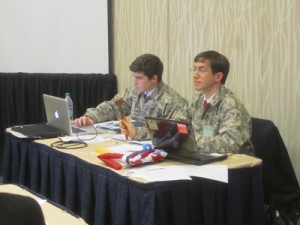This article is part of a series focusing on developing crisis committees. This article has been provided by Vedant Sachdeva, a delegate from West Windsor-Plainsboro High School South.
Just as certain chairs fit certain people, certain chairing styles fit certain committees. Earlier this year, Best Delegate featured an article about NAIMUN that detailed some of the descriptions of their chair training. It reflected a little upon the various chairing philosophies, discussing the concepts of active and passive chairs in committees. Everyone’s committee experience is impacted by the way a chair runs committee, so chairs should strive to make sure their committees are run as well as possible. However, how do you know what style fits your committee?
Since the way crisis committees are run play a larger role in a delegate’s than moderation in other committees, this article will speak more towards how to run a crisis committee. Unlike other committees, the way a crisis committee is run is not purely dependent on the chair; it is dependent on two components: a crisis staff, and a dais. The dais, which consists of a chair, vice-chair, and others who know a lot about the topic, is in charge of moderating debate. The crisis staff, which encompasses a small group ready to work themselves to the bone, are in charge of directing debate. Given that Crisis committees are much more in detail than GAs, both parties should know the subject very well. In addition to knowing the material well, there are a few other things that the crisis staff and dais should to ensure that a crisis committee runs smoothly. Here are four tips for chairing a crisis committee.
1. Direct the speed of debate
One big thing that can go wrong with crisis committees is that the speed of debate doesn’t mesh with the rate at which crises are released. If debate goes too quickly for crisis staff to keep up with, debate can go stagnant. If debate goes too slowly, crises can seem overwhelming, and the committee will find it hard to act. Keeping the gears properly meshing requires heavy coordination. Chairs need to coordinate with their crisis staff in order to properly direct the flow of debate. If that means requesting a crisis to redirect debate, then do it. If it means demanding a committee action order within a certain period, then do it. Anything to keep the gears of committee turning smoothly.
2. Have a well-staffed, well-prepped Crisis Staff
Another thing that tends to plague MUN conferences is a lack of crisis staffers for committees. Staffing a crisis committee is a lot of work, involving writing crises, responding to portfolio requests, adjusting and adapting the circumstances to take into account the actions of committee, and answering the committee’s questions on crises. This requires at least 4-5 people, where one serves as crisis manager, and the other staffers serve as analysts, and provide reports for the manager to use. A clear chain of command allows for recommendations and orders to be done efficiently. In addition, these people should be the best researched, so they can provided detailed, and accurate crises.
3. Know the Timeline
Crisis committees are driven by the concept of a timeline, which is essentially the series of events the committee will have to address as they progress. This timeline should be prepared well in advance, and should have one starting point, from which there are multiple branching paths, all of which ultimately end at one point. Just like any good story, the timelines should have climaxes which delegates should be able to recognize. The purpose of having branches is to account for the actions of the committees as other crises unfold. However, by no means must this timeline be strictly adhered to: the timeline is merely a guideline, and a general idea the crisis staff can refer to as committee goes on.
4. Keep it Informal
Crisis committees are typically small, and the delegates are seated in long table formats. Such characteristics allow for some relaxation of parliamentary procedure (parli pro), seeing as parli pro is primarily used to maintain decorum. Maintaining decorum is significantly easier in small committees, so parli pro isn’t as necessary. In fact, keeping the committee informal allows for better discussion, as delegates are allowed follow-up questions and direct responses that are otherwise prohibited. Better discussion allows delegates to debate more ideas, more thoroughly, which allows for stronger, and sometimes more creative results. Relaxation of parli pro also makes it easier to direct debate. Chairs should be exercising their power to adjust agendas and rules to keep debate pertinent, and to get everyone involved.
There’s no denying it, running a crisis committee is a lot of work. But crisis committees, when run well, are many times more enjoyable than boring old GAs, and often provide a stronger educational experience, as a result of their specificity.


